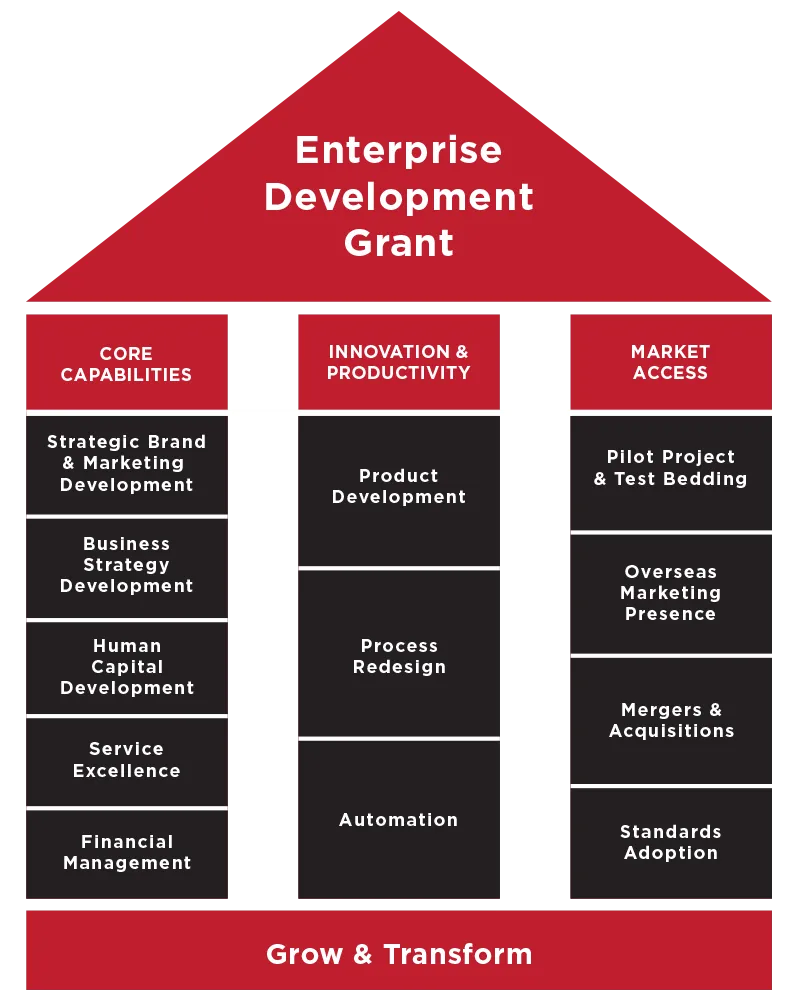Summary
The Singapore government has always been supportive of startups and SMEs by providing numerous avenues for financial support from tax incentives to grants. As such, this is one of the many reasons why the Lion City has become such a popular spot for global businesses to site. That's why it's key to know what types of grants and schemes are available out there that businesses can leverage on.
Government grant for Startups and SMEs: Why it's important
In Singapore, inflation is on the rise. Business expenses such as utilities, renting of office spaces and hiring are rising fast. As a business owner, you may want to consider Singapore’s plethora of government grants to protect your bottom line. It may also ensure that your business’s cash flow remains healthy as you continue to navigate Singapore’s current economic conditions.
Startup and SME growth and support in Singapore
The Singapore government has consistently recognized the importance of small and medium-sized enterprises (SMEs) in driving the country's economic growth, which is why they offer several Government grants for SMEs in Singapore. The government has implemented various policies and programs to support the growth and development of SMEs in Singapore.
Subsidies for technology and innovation
The government's emphasis on innovation and technology has resulted in a range of grants and subsidies aimed at helping SMEs adopt new technologies and stay competitive in their respective industries. The Productivity Solutions Grant (PSG) provides funding support for up to 80% of the cost of adopting pre-scoped productivity solutions. The grant covers solutions in areas such as financial management, customer management, and inventory tracking.
Similarly, the Enterprise Development Grant (EDG) provides SMEs with the funding support of up to 70% of the cost of qualifying projects, including adopting technology and innovation. The EDG is available to companies across all sectors and aims to help SMEs upgrade their business capabilities and expand into overseas markets, making it a popular SME grant in Singapore.
Export support
Given Singapore's status as a global business hub, the government has also implemented programs to support SMEs looking to expand overseas. The Market Readiness Assistance (MRA) grant provides funding support of up to 70% of eligible costs to help SMEs enter new markets. This includes market assessment, market entry, and business matching services, which is a highly beneficial SME grant in Singapore.
The Global Company Partnership (GCP) grant is another program aimed at helping SMEs expand overseas. The GCP provides SMEs with funding support of up to 70% of eligible costs for overseas business development and investment initiatives, making it a top SME grant in Singapore.
Skills development
The government also recognizes the importance of a skilled workforce in driving business growth and development. The SkillsFuture Enterprise Credit (SFEC) is a grant aimed at encouraging SMEs to invest in the development of their employees' skills. The grant provides funding support of up to $10,000 for SMEs to invest in approved courses and programs for their employees.
Additionally, the Enhanced Training Support Package (ETSP) provides SMEs with funding support of up to 90% of the cost of eligible courses to upgrade the skills of their employees. This SME grant in Singapore is beneficial for companies that want to upskill their employees.
The Singapore government's commitment to supporting SMEs is evident in the range of grants and programs available to these businesses. With a long list of excellent SME grants in Singapore, the government is active in promoting the growth of such businesses in the country. By taking advantage of these programs, SMEs can better position themselves for long-term success and contribute to the growth of a broader and more successful economy.
Some key facts and information about startup and SME grants in Singapore
If you're a startup or small or medium-sized enterprise (SME) in Singapore, securing grants can be a game-changer for your business growth. In Singapore, the government recognizes the significant role that startups and SMEs play in the country's economic growth. To help support their growth and development, the government offers various SME grants in Singapore.
In this section, we'll provide you with everything you need to know about startup and SME grants in Singapore. Read on to know more.
When should you consider a startup or SME grant?
If you are an SME in Singapore, it is always wise to explore the various SME grants available to help grow your business. Here are some situations where considering a grant may be beneficial for your business:
- If you are looking to expand your business and need funding for new projects or investments.
- When you are exploring new markets and need support, conduct market research, develop marketing campaigns, or establish partnerships.
- Entrepreneurs who want to upgrade their business capabilities through technology adoption, process improvements, or staff training.
- Businesses looking to enhance productivity and efficiency through automation, lean management, or quality certifications.
- You’re a startup in the early stages, seeking support for product development, business model validation, or initial market entry.
What activities are financed by a startup and SME grants?
Both startup and SME grants can cover a wide range of activities that support growth and innovation, from business process improvement to R&D and internationalization. Here are some examples of activities that can be financed by startup and SME grants in Singapore:
- Productivity improvement projects such as automation, digitalization, and workflow optimization.
- Innovation and R&D activities such as new product development, prototyping, and patent filing.
- Capability development activities such as staff training, business consultancy, and quality certification.
- Market access and internationalization activities such as market research, trade fairs, and overseas business development.
- Startup support such as early-stage funding, building minimum viable products (MVPs), and joining structured incubation or acceleration programs.
What agencies handle grants in Singapore?
The Singapore government offers a variety of grants and assistance schemes for startups and SMEs through several agencies. Here are some of the key agencies that handle startup and SME grants in Singapore:
Enterprise Singapore
Enterprise Singapore is the main government agency supporting the growth and development of startups and SMEs. It provides a range of grants and assistance schemes for startups and SMEs in various areas, such as productivity, innovation, and internationalization.
Infocomm Media Development Authority (IMDA)
IMDA provides grants and support for startups and SMEs in the infocomm and media sector, including areas such as digitalization, cybersecurity, and talent development.
National Research Foundation (NRF)
NRF provides grants and funding support for R&D and innovation projects in various sectors, such as biotechnology, advanced manufacturing, and urban solutions.
Workforce Singapore (WSG)
WSG provides funding support for workforce development and training initiatives, including schemes such as Enterprise Training Support (ETS) and Workfare Training Support (WTS).
Startups and SMEs in Singapore have access to a variety of grants and assistance schemes that can help them grow and thrive in the competitive business landscape. By leveraging these grants, startups and SMEs can gain a competitive edge, improve their capabilities, and tap into new markets and opportunities.
To get you started, we’ve compiled a list of the top government grants for startups and SMEs geared towards small businesses and entrepreneurs based on their different needs.
Top startup grants in Singapore:
1. StartupSG Founder

The StartupSG Founder scheme provides first-time entrepreneurs with mentorship, funding support and comprehensive access to business networks. This scheme is relatively unique as it matches mentors to start-ups by co-matching S$5 to every S$1 raised by the entrepreneur, which can go up to S$50,000 in funding capital.
To be eligible for this StartupSG Founder grant, the main applicant(s) must:
- Be a first-time entrepreneur & Singaporean Citizen or Permanent Resident
- Hold more than 30% equity
- Commit full-time and be the key decision-maker of the company upon acceptance of the grant
Additionally, the startup company must also:
- Be operating within 6 months of incorporation at the point of application
- Have a minimum of 51% Singaporean Citizen/ PR shareholding
- Have business activities conducted mainly/wholly in Singapore
- Have not received funding for the proposed business idea from another government organisation
- Not be in areas such as cafes, nightclubs, lounges, bars, foot reflexology, massage parlours, beauty salons, gambling, prostitution, social escort, etc.
Since the grant is only available for first-time entrepreneurs, there must not be more than one business entity registered under the applicant's name. The business should also not have been registered or incorporated for more than 6 months at the point of application for the grant.
Who Is It For?
- First-time entrepreneurs who have innovative business ideas and are looking to start a new company.
- Singaporeans or Permanent Residents who hold at least 30% equity in the company.
How To Apply?
- Create a company profile and submit an online application form
- Prepare the required documents, such as a business plan and financial projections
- Await evaluation by a StartupSG panel and attend an interview if requested
- Receive approval and grant of up to $30,000 in equity-free funding
2. StartupSG Tech
The StartupSG Tech is especially catered to tech startups by providing successful applicants with early-stage funding for commercialisation of proprietary technology. Startups can either apply for a Proof of Concept (POC) Grant of up to $400,000 if the project is still at conceptualisation stage (technical/scientific viability of concept yet to be tested) or a Proof of Value (POV) grant of up to $800,000 for developing a working prototype (The concept has technical/scientific viability).
To be eligible for this StartupSG Tech grant, the main applicant(s) must:
- Singaporean Citizen or Permanent Resident
- Hold more than 30% equity held directly or indirectly by Singaporean(s) and/or Singapore PR(s)
- Be undertaking a significant role in the company, for instance main applicant should not be a mere shareholder
Additionally, the startup company must also:
- Be registered in Singapore within the past 10 years at the time of grant applications
- Not be a subsidiary of a corporate entity at point of incorporation
- Have group annual sales turnover that is not more than $100 million or group employment size is not more than 200 workers
- Have core R&D activities to be carried out in Singapore
Who Is It For?
- Tech startup founders working on projects in advanced manufacturing and robotics, biomedical sciences and healthcare, clean technology, information and communication technologies, emerging industries, precision engineering, transport engineering and services, food science and technology, or agritech
How To Apply?
- Create a company profile and submit an online application form
- Prepare the required documents, such as a business plan and financial projections
- Await evaluation by a StartupSG panel and attend an interview if requested
- Receive approval and grant of up to $30,000 in equity-free funding
3. VentureForGood (VFG) Grant
Provided by the Singapore Centre for Social Enterprise (raiSE), this grant is accessible to both new and existing social enterprises who need funding to start up or expand business operations. Funding can go up to $300,000.
To be eligible for this VFG grant, the company must:
- Registered/intend to register under Companies Act or Co-operative Societies Act
- Incorporated (if not incorporated at point of application and in the process of prototyping, partnership with relevant social service agency and/or validation with intended beneficiary groups should be shown)
- Registered as raiSE member at the point of grant disbursement
- Address local social gap/need
Who Is It For?
- Startup companies in their early or seed stages that are Social Enterprise members of raiSE can receive support to create more human-centered social impact, such as providing employment opportunities for disadvantaged individuals.
How To Apply?
- Submit your pitch deck and additional documents such as your ACRA profile, management accounts of up to 2 years, if applicable, financial projections of at least 2 years and resumes of the founding team to vfg@raise.sg.
4. Business Improvement Fund (BIF)
The BIF is offered by the Singapore Tourism Board and is targeted towards firms in the tourism sector through encouraging technology innovation along with adopting new business models and processes to improve productivity and competitiveness.Successful Startups/SMEs can receive funding support of 70% of qualifying costs, which include training costs, hardware and software costs, internal manpower costs, travel costs, and third-party project-related costs.
To be eligible for this BIF, the company must:
- Singapore-registered
- Be under the tourism sector taking on core capability development initiatives or under the technology sector creating innovative products and services for tourism businesses
Who Is It For?
- Tourism business or technology companies creating products for the tourism industry
How To Apply?
- Prepare an executive summary (e.g. project objectives, description, schedule, and costing) of your project and submit it to STB_Incentives@stb.gov.sg
- An STB officer will be in touch to advise on the eligibility of your project to proceed with the application process.
- Submit a formal application form thereafter via the Business Grants Portal
Top SME grants in Singapore:
1. Enterprise Development Grant (EDG)

The Enterprise Development Grant (EDG) is a relatively new grant launched by Enterprise Singapore (ESG) on 25th October 2018. Essentially, this SME grant is a combination of the former Capability Development Grant (CDG) and Global Company Partnership (GCP) Grant.
The EDG aims to help SMEs in Singapore by building internal capabilities within 3 main areas: Core Capabilities, Innovation and Productivity, and Market Access.

This grant is suitable for local companies who are looking to upgrade the business, innovate or expand overseas. It funds up to 80% of qualified project costs including consultancy fees, purchase of software and equipment and internal labour costs. For enterprises that have been severely impacted by COVID-19, the maximum support level may even be raised to 90% on a case-by-case basis.
Application of the EDG grant will be assessed based on the project scope, project outcomes and competency of the service provider.
To be deemed eligible for Enterprise Development Grant (EDG) grant, applicants need to:
- Be a registered business and operating in Singapore
- Have a minimum of 30% local shareholdings
- Be in a feasible financial situation to start and complete the project
Additionally, you will need your company’s CorpPass and the following requirements to apply:
- ACRA information
- Audited financial statements
- Relevant proof of quotation or proposal
- Management consultancy scopes
- Relevant consultants’ certification
Who Is It For?
- SMEs seeking to grow and transform their business across various areas such as innovation, overseas expansion, and capability development.
- Companies with a minimum of 30% local shareholding, and annual sales turnover not exceeding SGD 100 million, or employment size not exceeding 200 employees.
How to Apply?
- Check if you are eligible for the grant
- Identify the project category, scope out the project and prepare the proposal
- Provide all necessary documentation
- Sign in to the Business Grants Portal using your CorpPass and complete your submission (which may take eight to twelve weeks)
- If you receive the grant, accept the Letter of Offer within the timeline
2. Market Readiness Assistance (MRA)

The focus of the Market Readiness Assistance (MRA) grant is to help Singapore SMEs to expand and gain access to overseas opportunities; from market set-up, identification of overseas partners to promotions.
This grant funds up to 70% of eligible costs capped at S$100,000 per company per new market* from 1 April 2020 to 31 March 2023 and covers:
- Overseas market promotion (capped at S$20,000)
- Overseas business development (capped at S$50,000)
- Overseas market set-up (capped at S$30,000)
SMEs must submit applications no earlier than 6 months before the project start date. Applications filed after 10 March will be treated as an application for the new fiscal year.
Here's the eligibility criteria to be deemed qualified for the MRA grant:
- The business entity is registered or incorporated in Singapore
- The business has at least 30% local shareholding
- Group annual turnover not exceeding S$100 million per annum based on the most recent audited report or group employment not exceeding 200 employees
*A new market refers to a target overseas country where the applicant company has yet to exceed S$100,000 in overseas sales in each of the last three preceding years.
Who Is It For?
- SMEs seeking to enter new overseas markets or expand their existing business in overseas markets.
- Companies with a minimum of 30% local shareholding, and annual sales turnover not exceeding SGD 100 million, or employment size not exceeding 200 employees.
How To Apply?
- Visit the Enterprise Singapore website to check your eligibility for the MRA Grant
- Prepare the required documents, such as quotation and invoice, for the project
- Apply for the grant on the Enterprise Singapore website
- Receive approval and reimbursement of up to 70% of the project cost
3. Productivity Solutions Grant (PSG)
Managed by Enterprise Singapore, the grant aims at supporting companies looking into taking up IT solutions and equipment to improve current business processes and productivity. Local SMEs can receive up to 50% in funding support, capped at $30,000.
To be eligible for this StartupSG Founder grant, the main applicant(s) must:
- Hold more than 30% equity held directly or indirectly by Singaporean(s) and/or Singapore PR(s)
- Not have made payment, and/or any form of deposits to a supplier, vendor or third party in relation to the purchase/lease/subscription of the IT solution or equipment prior to application submission
Additionally, the startup company must also:
- Registered and operating in Singapore
- Have group annual sales turnover not exceeding S$100 million OR group employment size not exceeding 200 employees
Who Is It For?
- Local SME’s looking for IT solutions and equipment to improve business productivity
How To Apply?
- Identify relevant solutions that best suit your business needs and select a suitable vendor
- Get direct quotations from approved vendors
- Prepare your documents such as contact details, company’s financial statements for the past 3 years, proposal and/or quotation from your vendor, deployment location/ tenancy agreement, and business impact
- Apply on the Business Grant Portal (BGP)
- Receive your letter of offer and complete your project
3. Productivity-Max (P-Max)

P-Max is a Workforce Singapore (WSG) Grant. The main purpose of the P-Max program is to support SMEs in recruiting, training, managing and retaining newly-hired PMETs (Professionals, Managers, Executives, and Technicians). This scheme is best suited for local SMEs looking to hire PMETs and/or looking to improve their HR practices within the company.
Participating SMEs can also reimburse up to 90% course fee subsidy for PMET, SME training workshops and Age Management workshop (applicable for P-Max for Older Worker only).
On top of that, eligible SMEs will receive a one-time $5,000 Assistance Grant or $10,000 Assistance Grant (P-Max for Older Workers only) upon completion of the Programme and six-month retention of the newly hired PMETs.
P-Max SME grant scheme eligibility requirements:
- Companies must be registered or incorporated in Singapore
- Group annual turnover not exceeding S$100 million per annum based on the most recent audited report or group employment not exceeding 200 employees
- At least 30% of local shareholding being held by Singapore Citizen or PR
- Hired a PMET within the last three months (90 days) prior to enrolment into the program, offering a gross monthly salary of at least $2,500
Who Is It For?
- SMEs that are registered and operating in Singapore.
- Have at least three local employees at the time of application.
- Have a minimum of 30% local shareholding.
- SMEs with an annual sales turnover of not more than S$100 million or have an employment size of not more than 200 employees.
- Are committed to upskilling and improving the productivity of their employees.
- Have not participated in the P-Max program or similar programs in the last 12 months.
Eligible companies can nominate up to two existing employees to participate in the P-Max program, which includes a 6-month Place-and-Train program and a follow-up SME consultancy project. The grant covers up to 90% of program fees and 70% of the participants' salary support, capped at S$2,000 per month for the duration of the program.
How To Apply?
- Attend the P-Max workshop to learn about productivity improvement plans
- Select a suitable consultant from the Enterprise Development Centres (EDCs)
- Complete the required documents, such as a letter of undertaking and consultant's proposal
- Submit the application to SPRING Singapore and receive approval
Who Is It For?
- Companies in all sectors that have made a mandatory CPF contribution for their employees.
- Companies that have experienced a decline in their monthly local workforce from November 2019 to September 2020.
- Companies that increase their monthly local workforce from September 2020 to February 2021.
- Companies that maintain the increment in their monthly local workforce from September 2020 to February 2021 for a period of six months.
- Companies that have not retrenched any employees in the six months before applying for the JGI.
Eligible employers will receive wage subsidies for all new local hires from September 2020 to February 2021, with higher subsidies for those aged 40 and above. The wage subsidies will be disbursed over a period of 12 months and will be capped at S$15,000 per new hire for the first year of employment.
How To Apply?
- Visit the IRAS website to check your eligibility for the JGI Grant
- Ensure that you have all required employment and CPF documents for the qualifying new hires
- Submit the application through the Jobs Support Portal
- Receive the JGI payout in the subsequent month of successful application
5. Capability Development Grant (CDG)
The Capability Development Grant (CDG) is a financial assistance program that supports businesses in their development journey. It helps enterprises upgrade their capabilities and grow through the adoption of new technologies, innovation, and productivity improvements. The grant is available to all local companies in Singapore, including small and medium-sized enterprises (SMEs). The CDG provides funding support for qualifying project costs such as consultancy, training, certification, upgrading of equipment and software, and other investments that can help businesses develop their capabilities.

Who Is It For?
- All local companies in Singapore, including SMEs
- Businesses looking to upgrade their capabilities and grow through new technologies, innovation, and productivity improvements
- Companies looking to improve their business processes and operations
How To Apply?
- Companies interested in applying for the CDG can do so through the Business Grants Portal (BGP)
- The application process involves filling in the relevant information and uploading the necessary documents
- The application is then assessed by Enterprise Singapore, and successful applicants will be notified of the outcome
- Successful applicants must complete their project and submit all required claims and documents within the given timeframe to receive their funding support.
Overall, the Capability Development Grant is an excellent opportunity for local businesses in Singapore to upgrade their capabilities and remain competitive in the marketplace. With its wide eligibility criteria and easy application process, it is an accessible grant that companies can take advantage of to achieve their growth objectives.
Alternatives to startup and SME Grants in Singapore
While government grants are an excellent way for small and medium-sized enterprises (SMEs) to access financial support, there are other options. In this section, we will explore some alternative financing options for SMEs.
Bank Loans
SMEs can apply for bank loans to finance their business operations or expansion plans. With a bank loan, the business owner can borrow money and pay it back over time with interest. This type of financing is widely available, and the terms and interest rates are generally more favorable than other financing options. Here are some of the top SME bank loans to apply for.
Crowdfunding
Crowdfunding is a popular option for SMEs that are just starting and need to raise money to get their business off the ground. This method involves raising funds from a large number of people through an online platform. In exchange for their contribution, the donors receive rewards, such as products or services.
Angel Investors
Angel investors are wealthy individuals who invest their own money in SMEs. In exchange for their investment, they typically receive equity in the business. These investors are often experienced entrepreneurs or business people who can guide and advise the SME.
Venture Capital
Venture capital (VC) is another alternative to government grants that SMEs can consider. This type of financing involves investing in a business in exchange for equity. Venture capitalists often provide more than just capital; they also offer mentorship, networking opportunities, and guidance to help the business succeed.
Peer-to-Peer (P2P) Lending
P2P lending is a type of financing that connects businesses directly with individual investors through online platforms, bypassing traditional financial institutions. This alternative funding option is especially attractive for startups and SMEs that may not meet the stringent requirements of bank loans or government grants. With faster approval times, flexible loan terms, and competitive interest rates, P2P lending offers a streamlined way to access working capital or fund business expansion. However, businesses should assess the credibility of the lending platform and understand the repayment obligations before committing.
Conclusion
Startups and SMEs in Singapore can apply for and enjoy the benefits of many of the grants detailed. Alongside these grants, businesses can also enjoy benefits available to all companies, such as low corporate tax rates, tight intellectual property rights standards, skilled workforce, and good connectivity to emerging markets in Asia.










%201.webp)


.webp)